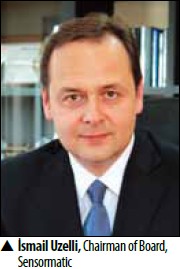According to IMS Research, Turkey is the No. 1 security market in the Middle East region, ahead of Saudi Arabia.A key driver for growth was that Turkey's economy improved significantly in 2010, explained Gurani Kilic, Country Sales Director for Bosch Security Systems. “New constructions— real estate sectors—grew by nearly 10 percent. In 2011, Turkey's economy broke the world record with 11 percent growth in Q1; overall, Turkey saw 7.5 percent growth in 2011.”
According to IMS Research, Turkey is the No. 1 security market in the Middle East region, ahead of Saudi Arabia.
A key driver for growth was that Turkey's economy improved significantly in 2010, explained Gurani Kilic, Country Sales Director for Bosch Security Systems. “New constructions— real estate sectors—grew by nearly 10 percent. In 2011, Turkey's economy broke the world record with 11 percent growth in Q1; overall, Turkey saw 7.5 percent growth in 2011.”
Kilic says the security industry enjoyed an active year in 2011, citing increased investments in Turkic nations and the surrounding regions, despite the debt crisis in Europe and riots in Libya and North Africa.
 New constructions play a key role in the security industry's substantial growth, agreed Bulent Cobanoglu, GM of Senkron Guvenlik. “Fire warning systems and intercom systems were heavily used in new buildings, and large quantities of perimeter security and video surveillance systems were put in place. The security industry, of course, benefited greatly from these installations.”
New constructions play a key role in the security industry's substantial growth, agreed Bulent Cobanoglu, GM of Senkron Guvenlik. “Fire warning systems and intercom systems were heavily used in new buildings, and large quantities of perimeter security and video surveillance systems were put in place. The security industry, of course, benefited greatly from these installations.”
However, the sudden increase in the parity of dollar near the end of 2011 had a negative impact on the security industry. “2011 started off pretty well, but we had a rough time during the last quarter and had to adjust our expectations for November and December.” said Ali Yildiz, GM of Oncu Guvenlik.
Still, 2011 was a good year for the security industry. The electronic security market has for years sustained its constant growth except for the periods of severe crises and 2011 was therefore positive for the electronic security market, stresses Ismail Uzelli, Chairman of Board at Sensormatic.
UTC Fire & Security Turkey saw 50 percent growth in 2010 and 35 percent in 2011, which signals a healthy rebound for Turkey's security industry. Turkey is now the 6th largest market in the UTC Fire & Security EMEA organization, said Ozan Demirel, Region Manager, Controls and Security Systems, UTC Climate.
For Bosch Security Systems, Turkey was the strongest growing country office in EMEA in both 2010 and 2011, according to Kilic.
20% Growth
Overall, industry experts agree that the security industry grew by 20 percent in 2011, compared to 2010. The security industry has generally grown by around 20 percent annually, and 2011 was no exception, said Hasim Yalssn, GM of Bilmak.
Saruhan Acar, GM of Bilgi Elektronik, arrived at a similar conclusion after studying its own volume, customer portfolio and sales. Acar said the security industry grew by at least 20 to 25 percent in 2011. Excluding the last mile, revenue for security equipment reached$500 to $600 million when including actual installations.
“Turkey's vigorous economy has been growing at a rate that is not seen much in Europe,” Kilic said. For Bosch Security Systems Turkey, sales increased by 32.4 percent in 2011. Kilic said that sector capacity in Turkey reached $275 million in 2011.
Videofon Security Systems achieved a growth of 15 percent in 2011, said CEO K.Mehmet Kahramanoglu. Kahramanoglu said the overall capacity of the sector in 2011 was around $650 million and dissects this number into product groups: Video surveillance (50 percent), intrusion detection (20 percent), fire alarm (10 percent), access control (10 percent) and others (10 percent). 30 percent of total sales revenue is contributed to installation and services, Kahramanoglu added. Uzelli provided a break down with similar conclusions: Video surveillance (60 percent), intrusion detection (12 percent), fire alarm (8 percent), access control (5 percent) and others (15 percent).
Honeywell Turkey's Mustafa Altunta? broke the numbers down as well: $250-300 million for CCTV, $70-80 million for intrusion, and $40-50 million for access control. Altuntas said that with perimeter security and special/private security equipment included, the electronic security market reached nearly $400 million in revenue in 2011.
When it comes to the distribution of security products, video surveillance takes one lion share of the total revenue. Total sales of video surveillance products reached $150 million, with the total security market pegged at $450 to $500 million, said Yusuf Ziya Oncel, Sales Manager at Pelco Turkey.
Following the market shrinkage following the crisis, the current electronic security market is around $440 million, said Levent Yildirim, Director of Siemens Substructure and Cities Sector Building Technologies.
The numbers are largely in the same range, but there is still a lot of potential for growth, said Metin Kastro, GM of Pronet Security. “Approximately 140,000 to 150,000 residences and offices have subscription to communication centers. With 17 million houses and 2 million offices in Turkey, we still have a lot to achieve.”
Moving forward, Ekrem Ozkara, GM of Okisan, predicts 15 percent growth in 2012, citing the increasing high-level projects in Turkey and its neighboring countries.
Products Carrying Momentum
Sales for network cameras have continued to grow. On the video surveillance side, growth has been mainly driven by IP-based video surveillance systems, which has approximately doubled, Oncel said. Having 90 percent of their sales came from IP-based systems, Oncel predicts that the analog market will be completely replaced by IP by 2014.
Acar agreed that video surveillance took the spotlight in 2011, and noted that IP-based systems are preferred over analog, especially when it comes to public tenders.
On the other hand, ?obanoglu believes that IP-based systems' market share of 10 to 12 percent in the video surveillance market underlines two basic problems: Data storageand transmission. Data storage is expensive, Cobanoglu said, and better compression technologies need to be developed to overcome this problem. Transmission will also benefit from better compression, since current bandwidths are not practical for video surveillance. IP-based video surveillance will show more potential once these two problems are solved, Cobanoglu said.
Regardless, there is always a need for more detailed images. Altuntas points at megapixel cameras as one of the rising stars of 2011, emphasizing that cameras with 10 and higher megapixels are now more common.
Kilic said that, one of the most significant developments in the security industry in 2011 was increased demand for HD video surveillance systems and products. In 2010, Bosch launched a HD product line that was developed to meet the demand for HD video in the IP-based security systems market. In 2011, this product group significantly expanded with new product launches.
 Ozkara mentioned that Mobile DVR were one of the most important developments in 2011. He said that many cities have announced mobile DVR projects since 2011, following new regulations. 800 to 1,000 mobile DVR projects have been launched for school buses and public buses, and Ozkara predicts that demand for this product group will accelerate in 2012.
Ozkara mentioned that Mobile DVR were one of the most important developments in 2011. He said that many cities have announced mobile DVR projects since 2011, following new regulations. 800 to 1,000 mobile DVR projects have been launched for school buses and public buses, and Ozkara predicts that demand for this product group will accelerate in 2012.
Uzelli added that the servers and network switches emerged in 2011 as another development. Security companies have become significant server and switch vendors due to the increased demand for them in security projects, Uzelli said. He said that server and network switch sales is becoming a big chunk of revenue for security companies. On the other side, IT companies are trying to become security companies, Uzelli said, and will be continue to acquire big security players.
Uzelli continued to emphasize that biometric access control and integrated HD video surveillance systems are on the rise, and that “companies that offered customers total solutions with high brand value and appropriate pricing undertook significant projects.”